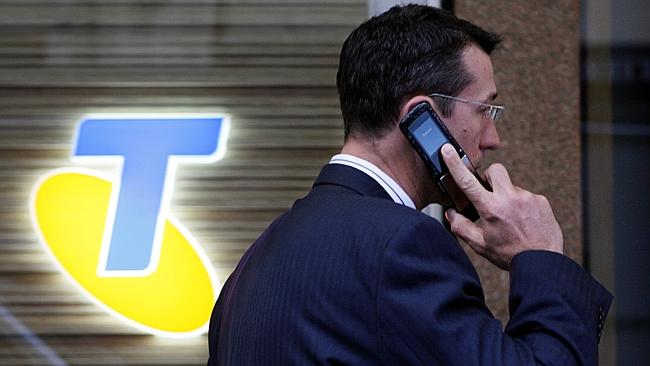
Telstra sent a text message alerting customers about how to reduce their risk of exposure to electromagnetic energy yesterday. Source: News Limited
TELSTRA alarmed some of its customers yesterday when it sent a message pointing out ways people can reduce their exposure to mobile phone radiation.
Australia’s largest telco texted its customers about 5.30pm with a “reminder msg” recommending they visit the Telstra website for information on “electromagnetic energy and tips to reduce exposure”.

A screengrab of the message. Source: NewsComAu
The website quotes advice from the World Health Organisation (WHO) about how to “reduce mobile phone exposure”. It recommends owners:
1. Use hands-free devices to keep mobile phones away from the head and body during phone calls
2. Limit the number and length of calls
3. Use the phone in areas of good reception to reduce exposure as the phone will transmit at reduced power.
Some customers took to Facebook to express their alarm over the message and discuss fears about links between mobile phone use and brain cancer.
So, should we be worried?
The Cancer Council’s position on the topic is that there is no compelling scientific evidence that mobile phone use increases the risk of brain cancer.
The World Health Organisation published a fact sheet on mobile phones and health in 2011 that came to a similar conclusion.
“A large number of studies have been performed over the last two decades to assess whether mobile phones pose a potential health risk. To date, no adverse health effects have been established as being caused by mobile phone use,” the fact sheet states.
The organisation’s International Agency for Research on Cancer found radio frequency electromagnetic energy emitted from mobiles was “possibly carcinogenic to humans”, but, as the

Experts say there is no concrete evidence of a link between mobile phone use and cancer. Source: News Limited
Cancer Council noted, the research was not rigorous enough to rule out other potential explanations for this findings, such as chance.
Professor Bernard Stewart from the Cancer Council told news.com.au that there was no proof of a causal link between mobile phones and cancer, unlike tobacco smoking “where the risk is both definitive and great”.
“There’s a case for saying that compared to other known causes of cancer, there is a very, very, very small risk if there’s a risk at all,” he said.
Despite the small risk, Prof Stewart echoed calls from the World Health Organisation for more research into the field.
“The call for research is not trivial or facile; it is a recognition that there is an inference of risk for heavy users and we have never looked at mobile phone usage over multiple decades,” he said.
Prof Stewart said the danger with consumers’ preoccupation with links between mobile phones and cancer was that it could divert attention from more crucial health messages that were based on concrete evidence.
Prof Stewart said the key health messages from the Cancer Council to avoid cancer risk were to stop smoking, to not drink alcohol daily, to avoid obesity and avoid unnecessary exposure to the sun.

Telstra says it is proactive with its safety messages. Source: News Limited
Telstra spokesman Steven Carey said the company proactively communicated an electromagnetic energy mobile safety message to all its mobile customers.
“These messages are sent to customers on a rolling basis. New customers receive the SMS within 14 days of activation and annually thereafter, while existing customers receive the annual SMS in April or August each year,” he said.
Mr Carey said Telstra drew on the expertise of the Australian Radiation Protection and Nuclear Safety Agency and the WHO for assessments of health and safety impacts.
“The WHO and other public health authorities advise that there is no substantiated scientific evidence that radiofrequency technologies that operate within national and international safety standards, including mobile phones and base stations, cause health effects,” he said.
“We want all our customers to have up-to-date and relevant information about using mobile phones. This includes offering information on all matters of mobile phone safety.”
But that didn’t stop Telstra customers asking if perhaps the provider knew something they didn’t. “This has just added a whole new level of stress to my phone addiction,” posted one user to Facebook. “This frightens me!” posted another.
Originally published as Telstra text freaks out customers
